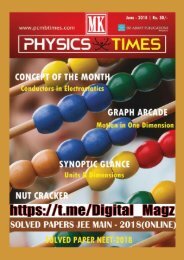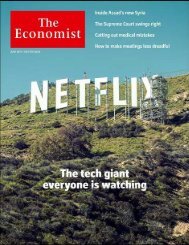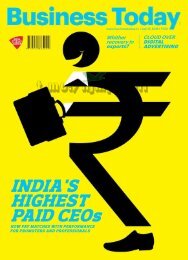Fortune
You also want an ePaper? Increase the reach of your titles
YUMPU automatically turns print PDFs into web optimized ePapers that Google loves.
from simultaneously licensing the products<br />
of its partners and creating similar oferings.<br />
“Tencent is both an investor and a competitor,”<br />
says Jef Smith, co-founder and CEO of<br />
San Francisco startup Smule, whose mobile<br />
apps allow a community of 50 million users<br />
to play and sing more than 20 million songs a<br />
day, often with each other. “Their views on the<br />
realpolitik of building successful technology<br />
companies reflect our own,” says Smith, citing<br />
the storied QQ-versus-WeChat competition.<br />
The entrepreneur calls Tencent a “great partner,”<br />
including, for example, the access Smule<br />
gets to Tencent’s content distribution network,<br />
a service that competes against Google and<br />
Amazon. Tencent, in turn, benefits from its<br />
broad investing by keeping close tabs on smart<br />
technology and talented people, even without<br />
owning their companies outright.<br />
Investment styles also inform the companies’<br />
search for growth outside China. Their<br />
home country accounts for the lion’s share<br />
of overall revenue for both companies. But<br />
both have set their sights on Southeast Asia.<br />
Tencent owns a 40% stake in the publicly<br />
traded Singapore gaming company SEA and<br />
has reportedly been considering other large<br />
investments. Alibaba, given to grand strategic<br />
goals, has said it wants to serve 2 billion<br />
customers and will make Southeast Asia its<br />
first major expansion area. “These economies<br />
are very similar to how China grew up,” says<br />
Joe Tsai, citing youthful populations, high<br />
levels of mobile-phone penetration, and an<br />
underdeveloped retail sector. “These are very<br />
similar characteristics that we see in China,<br />
without the existing baggage of traditional<br />
industries,” says Tsai. (See “Chess Pieces in<br />
Southeast Asia.”)<br />
When the two Chinese giants might attack<br />
the more-developed U.S. market directly has<br />
been a perennial discussion point among their<br />
Silicon Valley counterparts. The short answer is<br />
not soon—a conclusion that may serve as some<br />
consolation for U.S. executives smarting at their<br />
near-total exclusion from the Chinese market.<br />
Despite having made many investments in U.S.<br />
companies, each has been swatted away from<br />
deals deemed sensitive on national-security<br />
grounds. Earlier this year, the intergovernmental<br />
Committee on Foreign Investment in the<br />
United States blocked Ant Financial’s attempt<br />
to buy U.S. remittance company MoneyGram.<br />
In a less closely watched move, CFIUS also<br />
nixed an investment by Tencent in Here Technologies,<br />
a Dutch digital mapping company<br />
with significant operations in the U.S.<br />
O<br />
ONE OF THE HALLMARKS of the Chinese Internet powerhouses is that<br />
they simultaneously move incredibly quickly and plan for the very<br />
long term—a tiring pace that demands a lot of the two horses who<br />
lead them. Jack Ma exudes that dual sense of urgency and longrange<br />
planning. His oice complex is tucked away in a corner of<br />
the Alibaba campus, across a small bridge from the chockablock<br />
buildings where his employees work. He has designed his compound<br />
in the fashion of the classical gardens of Suzhou, a treasured,<br />
ancient spot near Hangzhou. But the eclectic look of Ma’s<br />
corporate hideaway reflects his man-of-the-world sensibilities,<br />
with various cultures represented inside its walls.<br />
On a smoggy day in late May, the Alibaba founder chooses to<br />
meet in his Japanese sitting room, with tatami mats, low-slung<br />
chairs, and traditional Chinese instrumental music playing softly<br />
on wall speakers. Two bowls of cherries and two cups of steaming<br />
tea are set down before he arrives. Ma’s mind is very much on<br />
the future. He relates that a fellow Chinese corporate mogul has<br />
recently told him he’s tired, and asked Ma how he keeps going. “I<br />
work hard because I’m prepared for the day when I leave this company<br />
and I can enjoy a peaceful life,” says Jack Ma. “I won’t have<br />
to come back to do something, like fix the kitchen,” he says. “In the<br />
meantime, this is the thing that drives me and so many of my associates:<br />
We always want to do good things for society.”<br />
At the conclusion of this meeting, Ma hops in a car to go to an<br />
Alibaba auditorium to greet hundreds of new employees. He warns<br />
them that life at Alibaba won’t necessarily be easy. “It takes a year<br />
to even figure out what’s going on,” he cautions. “And you’re not a<br />
true ‘Aliren’ ”—the Alibaba analog to “Googler”—“before three years<br />
of service.” He tells the recruits Alibaba is idealistic, pragmatic,<br />
and optimistic, but that it’s not for everyone. “There’s still time to<br />
leave,” he deadpans to hearty gufaws in the room.<br />
The years of entrepreneurial battles are catching up with Pony<br />
Ma as well. At the <strong>Fortune</strong> conference in Guangzhou, he addressed<br />
criticism about the addictive and omnipresent nature of<br />
products like Tencent’s games by acknowledging society’s overattachment<br />
to their phones. “Even I get a bit anxious sitting here<br />
while my phone is ofstage,” he said. He allows that just recently<br />
his eyesight has gotten worse, which he attributes not so much to<br />
the onset of middle age as to too many hours spent staring at his<br />
phone. “I wish the next-gen instant-messaging platform would<br />
not be such a burden on your eyes,” he said. “If there’s a brain<br />
wave that can transmit the message to my consciousness, that<br />
would be perfect.”<br />
Give him time, and it just might happen. Wait a little longer,<br />
and Alibaba just might launch a brain-wave platform, too—with a<br />
cuddly critter for a mascot.<br />
www.t.me/velarch_official<br />
Additional reporting by Eamon Barrett and Kurt Zhong<br />
FEEDBACK LETTERS@FORTUNE.COM<br />
83<br />
FORTUNE.COM // JULY.1.18
















